Charles E W Bean, Diaries, AWM38 3DRL 606/237/1 - October 1914 - 1918 - Part 5
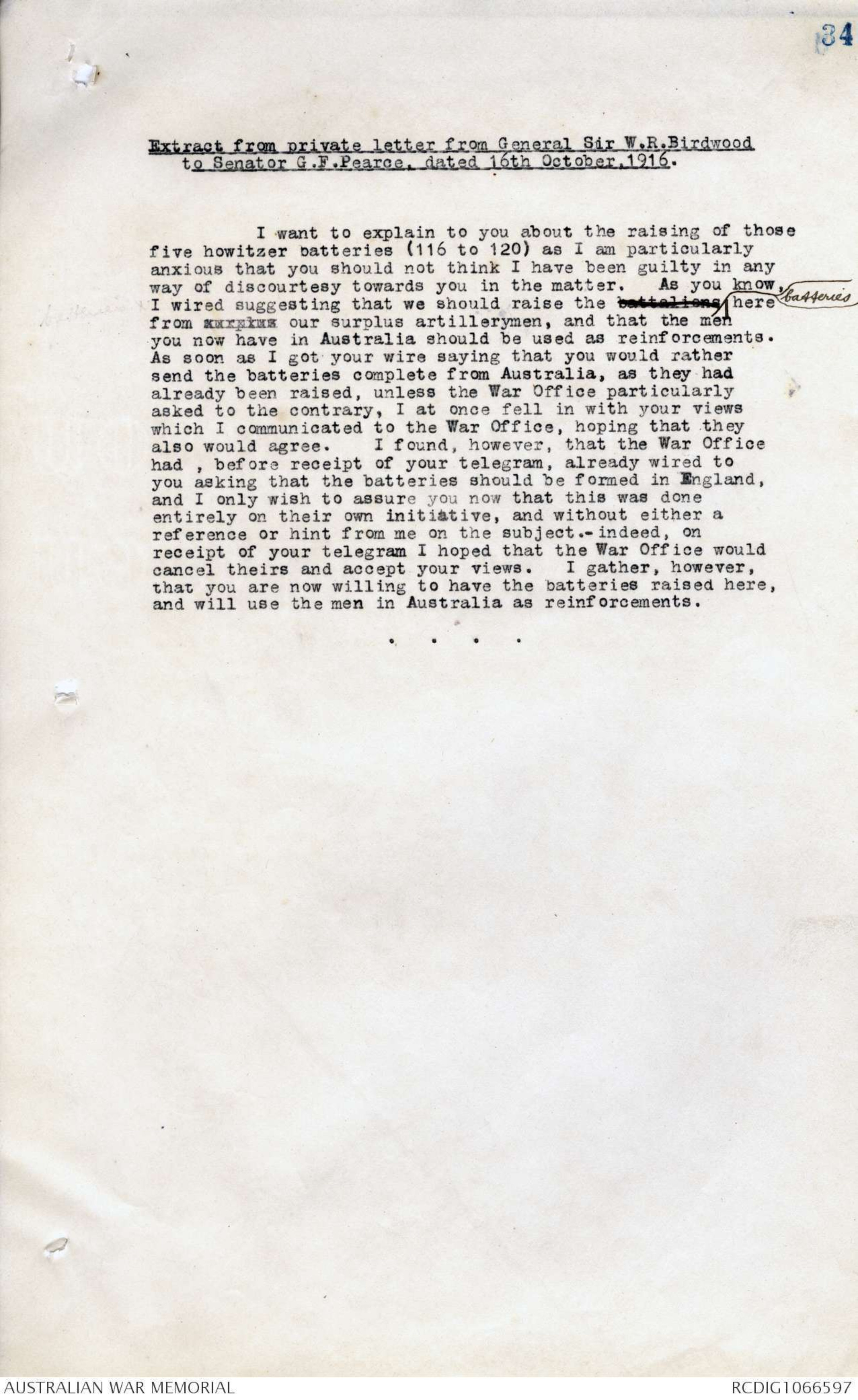
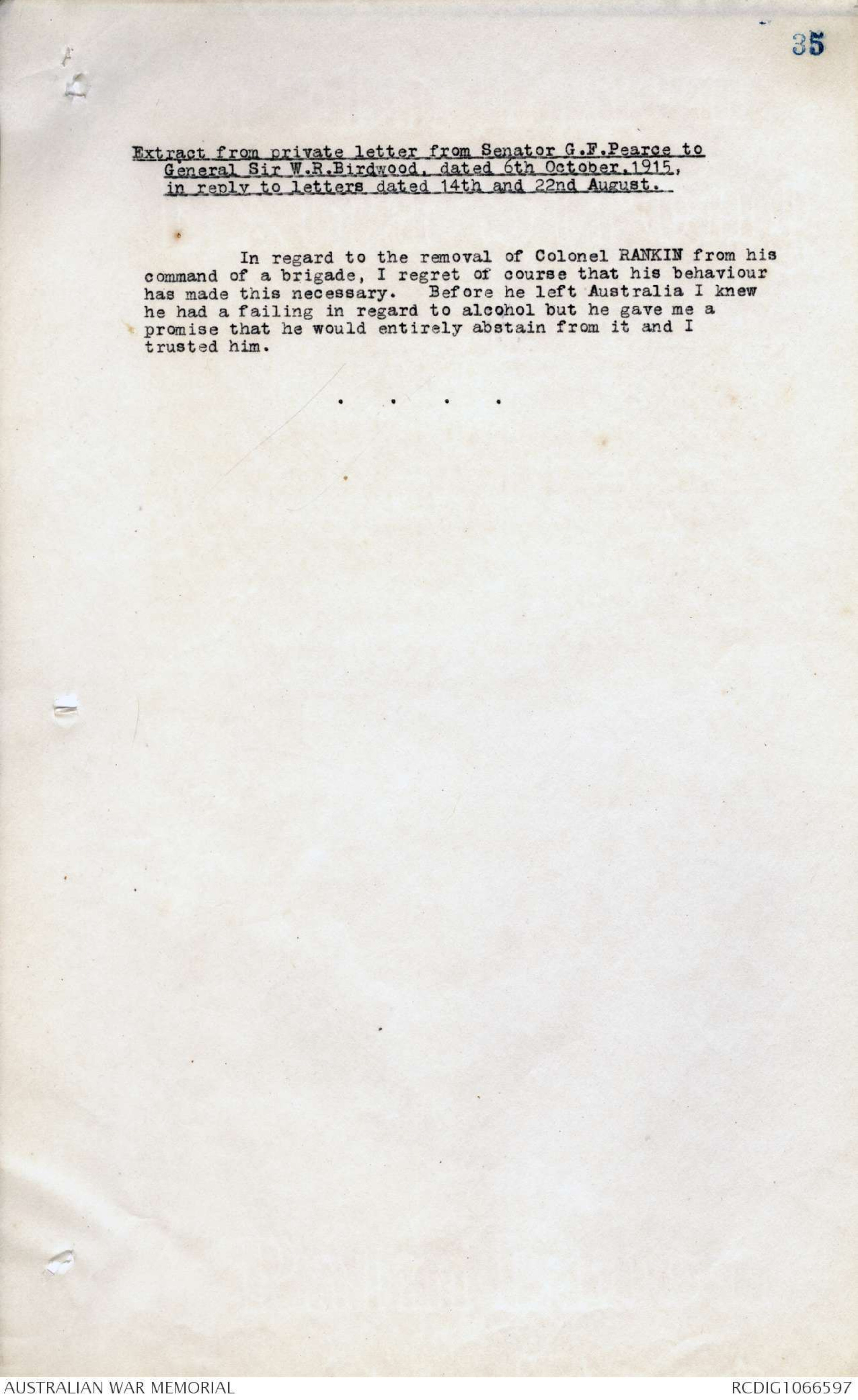
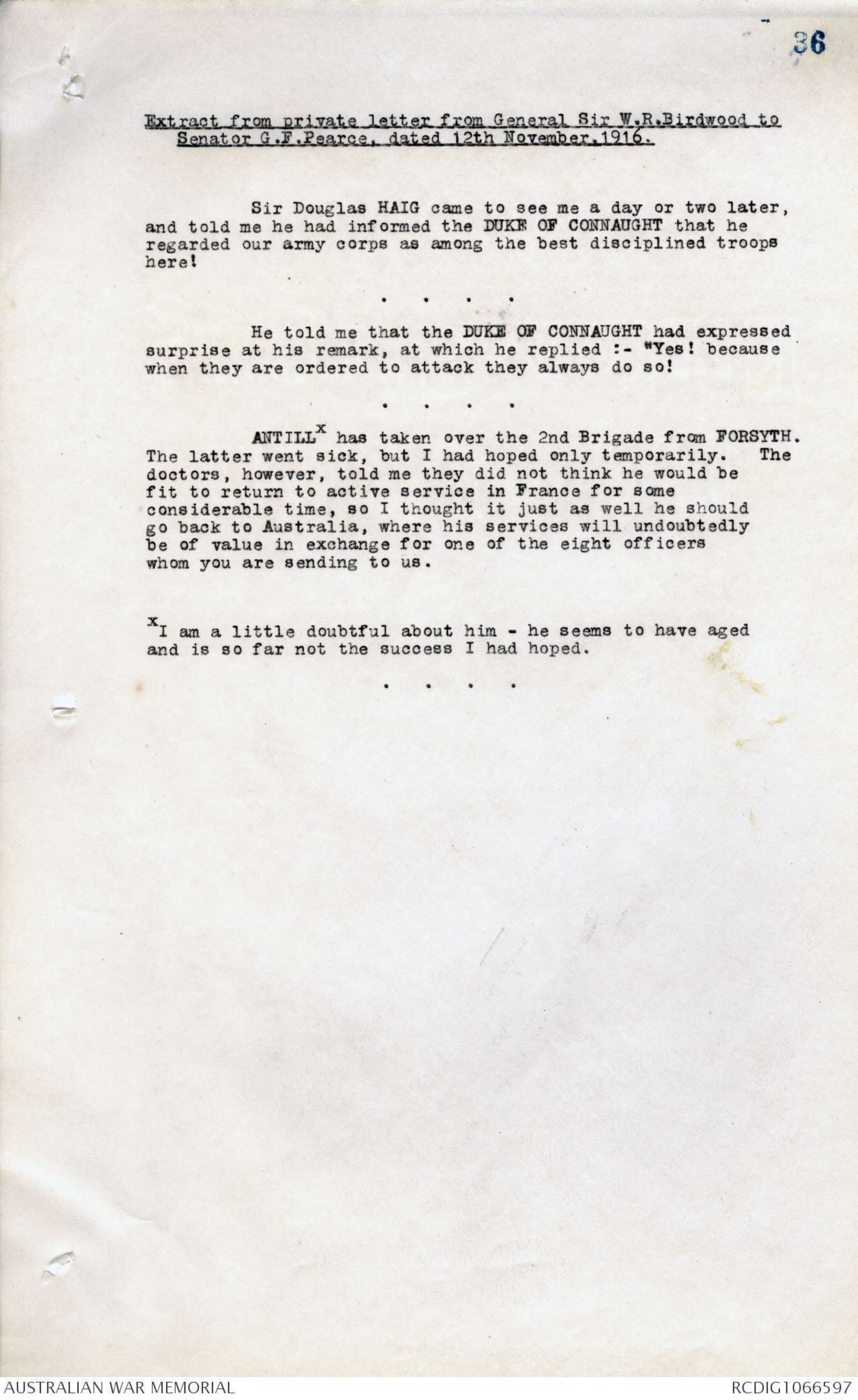
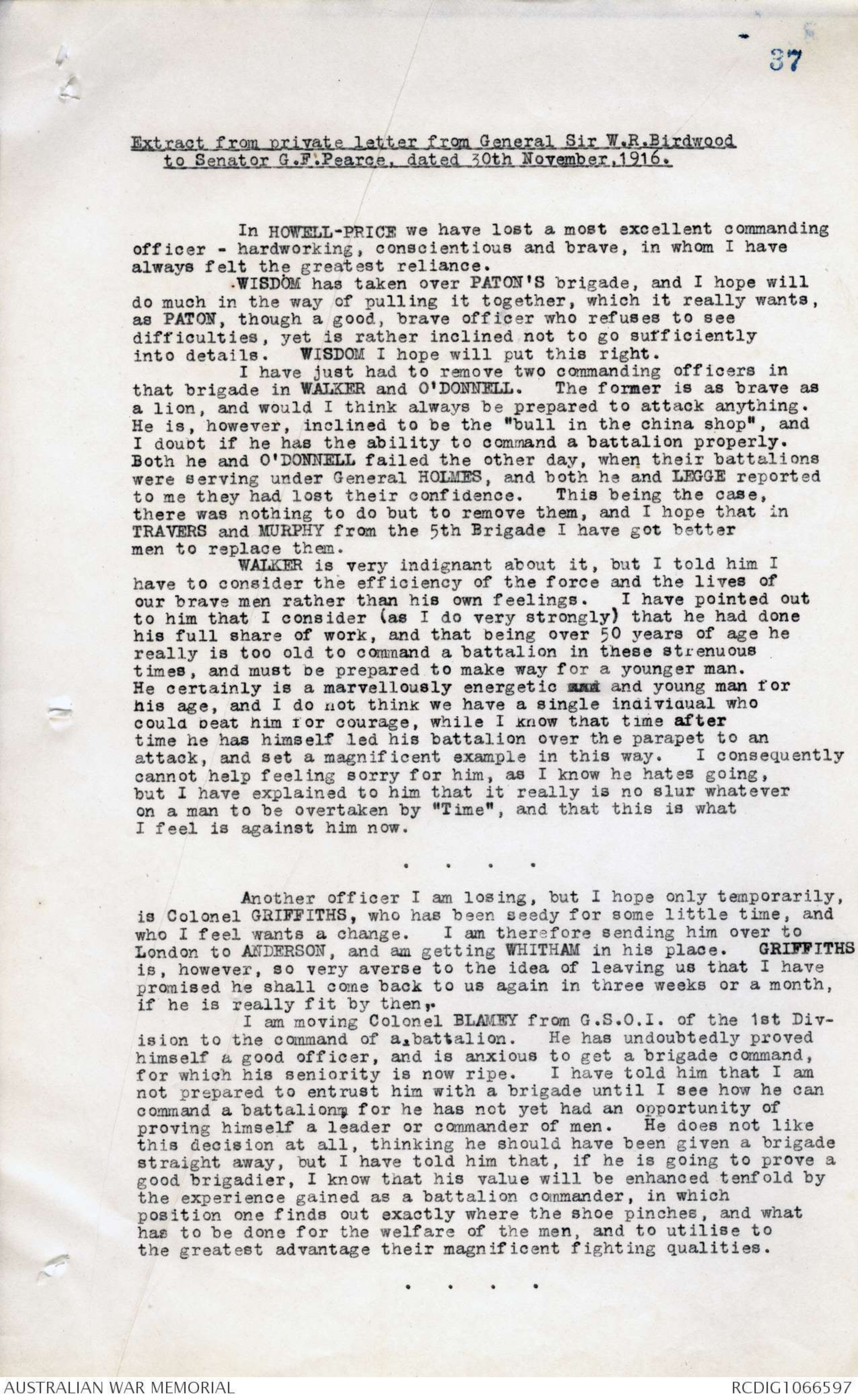
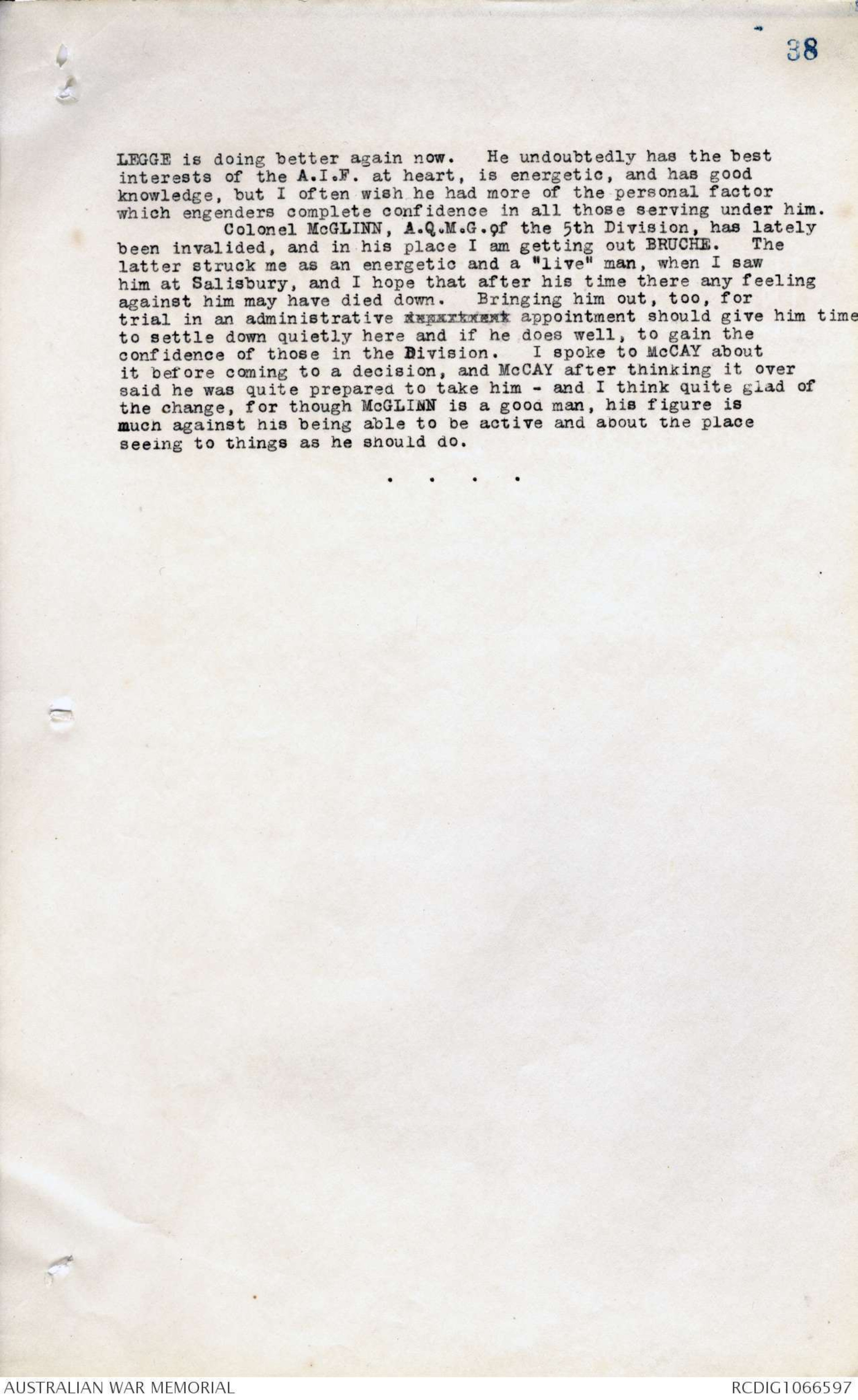
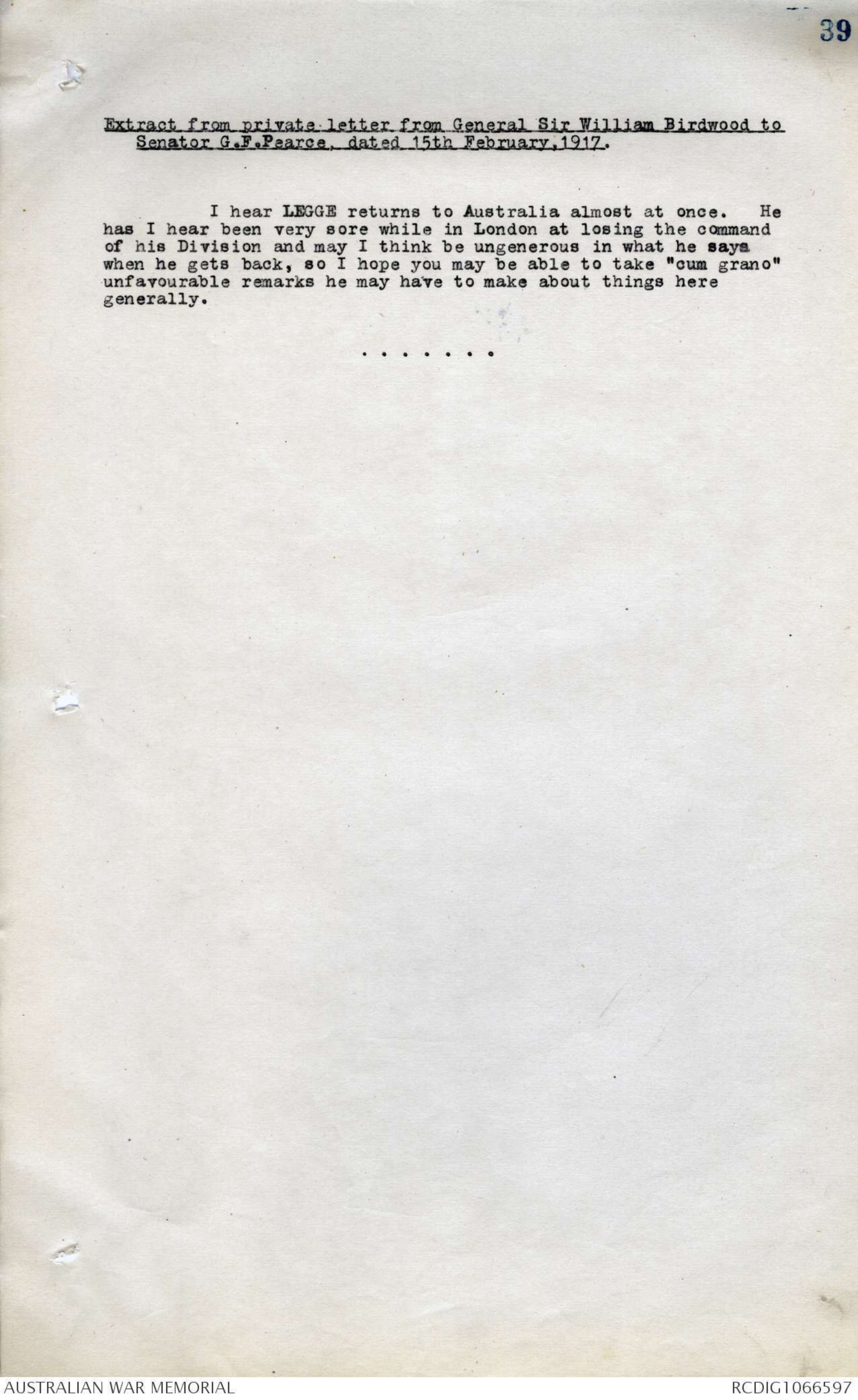
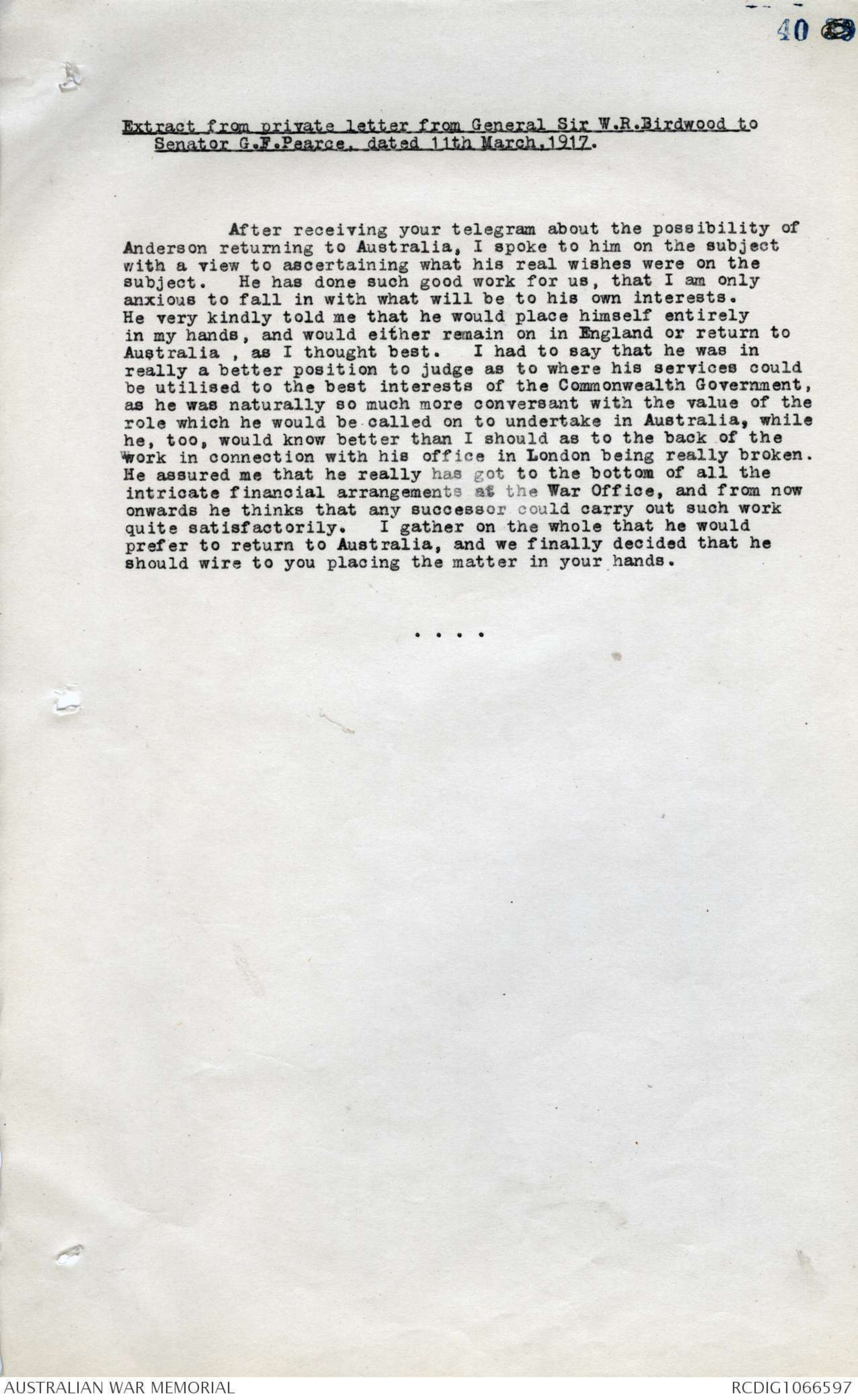
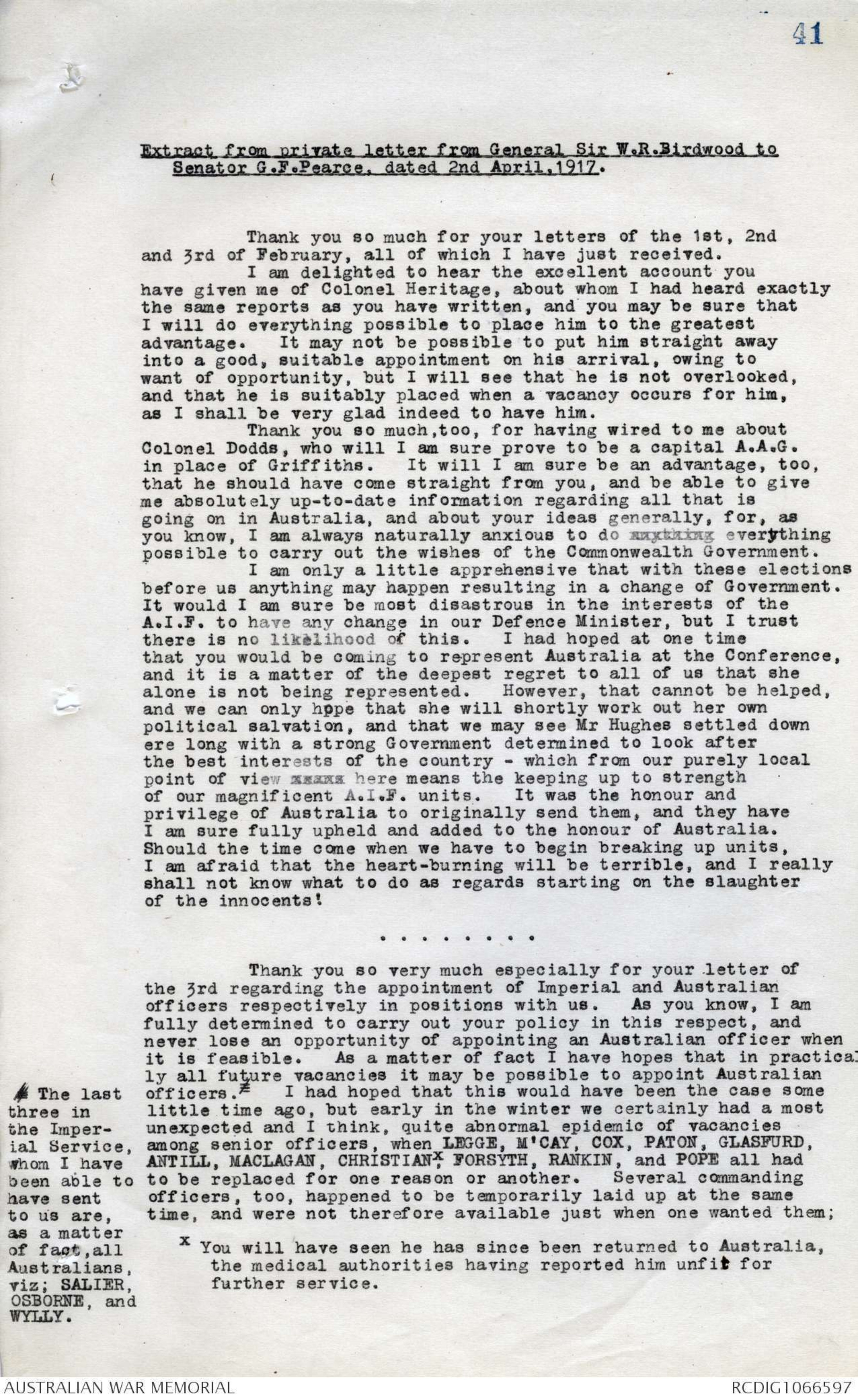
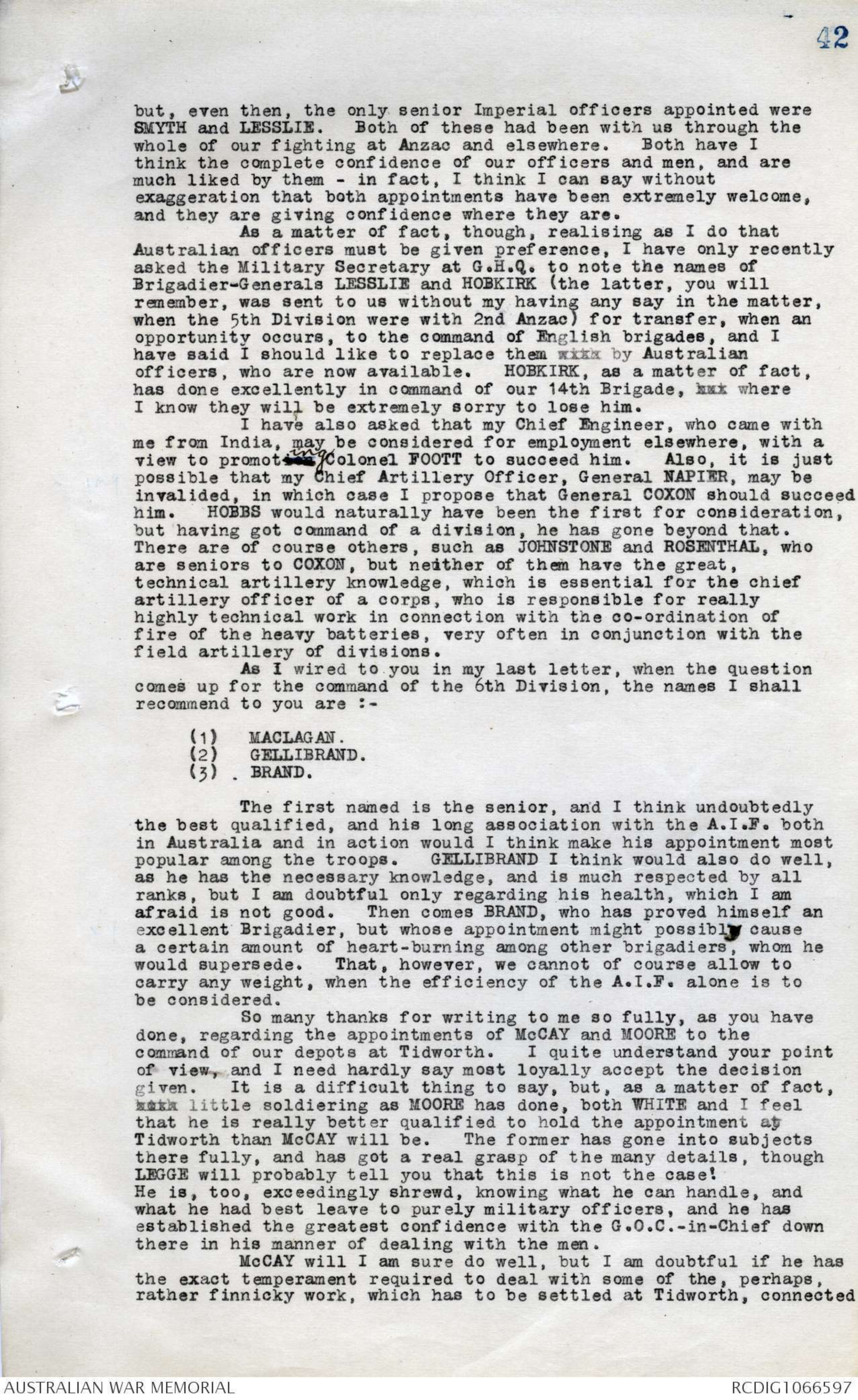
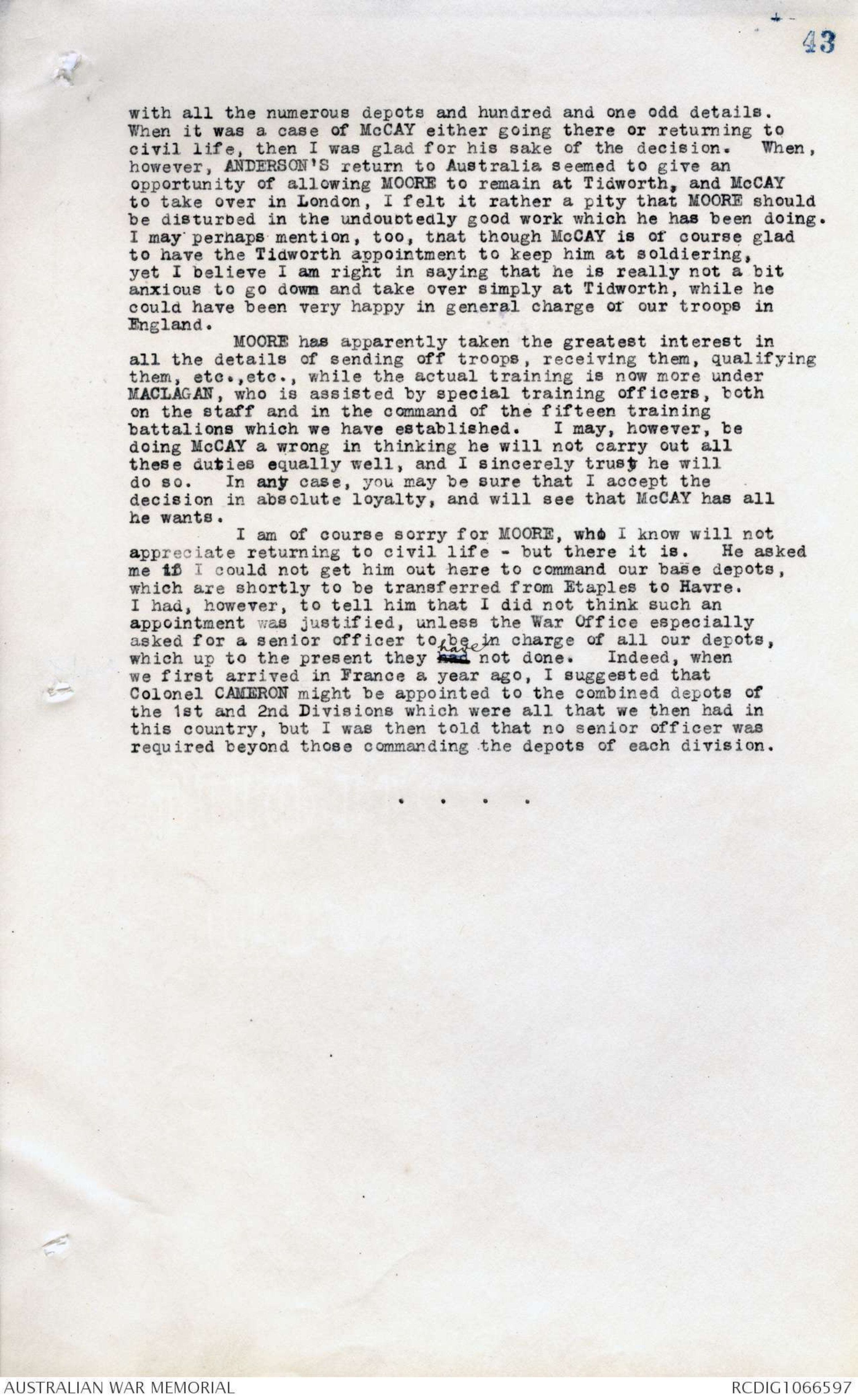
34
Extract from private letter from General Sir W.R.Birdwood
to Senator G.F.Pearce, dated 16th October, 1916.
I want to explain to you about the raising of those
five howitzer batteries (116 to 120) as I am particularly
anxious that you should not think I have been guilty in any
way of discourtesy towards you in the matter. As you know,
I wired suggesting that we should raise the battalions ^batteries here
from surplus our surplus artillerymen, and that the men
you now have in Australia should be used as reinforcements.
As soon as I got your wire saying that you would rather
send the batteries complete from Australia, as they had
already been raised, unless the War Office particularly
asked to the contrary, I at once fell in with your views
which I communicated to the War Office, hoping that they
also would agree. I found, however, that the War Office
had, before receipt of your telegram, already wired to
you asking that the batteries should be formed in England,
and I only wish to assure you now that this was done
entirely on their own initiative, and without either a
reference or hint from me on the subject.-indeed, on
receipt of your telegram I hoped that the War Office would
cancel theirs and accept your views. I gather, however,
that you are now willing to have the batteries raised here,
and will use the men in Australia as reinforcements.
35
Extract from private letter from Senator G.F.Pearce to
General Sir W.R.Birdwood, dated 6th October, 1915,
in reply to letters dated 14th and 22nd August.
In regard to the removal of Colonel RANKIN from his
command of a brigade, I regret of course that his behaviour
has made this necessary. Before he left Australia I knew
he had a failing in regard to alcohol but he gave me a
promise that he would entirely abstain from it and I
trusted him.
36
Extract from private letter from General Sir W.R.Birdwood to
Senator G.F.Pearce, dated 12th November. 1916.
Sir Douglas HAlG came to see me a day or two later,
and told me he had informed the DUKE OF CONNAUGHT that he
regarded our army corps as among the best disciplined troops
here!
He told me that the DUKE OF CONNAUGHT had expressed
surprise at his remark, at which he replied :- "Yes! because
when they are ordered to attack they always do so!
ANTILLx has taken over the 2nd Brigade from FORSYTH.
The latter went sick, but I had hoped only temporarily. The
doctors, however, told me they did not think he would be
fit to return to active service in France for some
considerable time, so I thought it just as well he should
go back to Australia, where his services will undoubtedly
be of value in exchange for one of the eight officers
whom you are sending to us.
xI am a little doubtful about him - he seems to have aged
and is so far not the success I had hoped.
37
Extract from private letter from General Sir W.R.Birdwood
to Senator G.F.Pearce, dated 30th November, 1916.
In HOWELL-PRICE we have lost a most excellent commanding
officer - hardworking, conscientious and brave, in whom I have
always felt the greatest reliance.
WISDOM has taken over PATON'S brigade, and I hope will
do much in the way of pulling it together, which it really wants,
as PATON, though a good, brave officer who refuses to see
difficulties, yet is rather inclined not to go sufficiently
into details. WISDOM I hope will put this right.
I have just had to remove two commanding officers in
that brigade in WALKER and O'DONNELL. The former is as brave as
a lion, and would I think always be prepared to attack anything.
He is, however, inclined to be the "bull in the china shop", and
I doubt if he has the ability to command a battalion properly.
Both he and O'DONNELL failed the other day, when their battalions
were serving under General HOLMES, and both he and LEGGE reported
to me they had lost their confidence. This being the case,
there was nothing to do but to remove them, and I hope that in
TRAVERS and MURPHY from the 5th Brigade I have got better
men to replace them.
WALKER is very indignant about it, but I told him I
have to consider the efficiency of the force and the lives of
our brave men rather than his own feelings. I have pointed out
to him that I consider (as I do very strongly) that he had done
his full share of work, and that being over 50 years of age he
really is too old to command a battalion in these strenuous
times, and must be prepared to make way for a younger man.
He certainly is a marvellously energetic xxx and young man for
his age, and I do not think we have a single individual who
could beat him for courage, while I know that time after
time he has himself led his battalion over the parapet to an
attack, and set a magnificent example in this way. I consequently
cannot help feeling sorry for him, as I know he hates going,
but I have explained to him that it really is no slur whatever
on a man to be overtaken by "Time", and that this is what
I feel is against him now.
Another officer I am losing, but I hope only temporarily,
is Colonel GRIFFITHS, who has been seedy for some little time, and
who I feel wants a change. I am therefore sending him over to
London to ANDERSON, and am getting WHITHAM in his place. GRIFFITHS
is, however, so very averse to the idea of leaving us that I have
promised he shall come back to us again in three weeks or a month,
if he is really fit by then,.
I am moving Colonel BLAMEY from G.S.O.I. of the 1st Division
to the command of a, battalion. He has undoubtedly proved
himself a good officer, and is anxious to get a brigade command,
for which his seniority is now ripe. I have told him that I am
not prepared to entrust him with a brigade until I see how he can
command a battalion, for he has not yet had an opportunity of
proving himself a leader or commander of men. He does not like
this decision at all, thinking he should have been given a brigade
straight away, but I have told him that, if he is going to prove a
good brigadier, I know that his value will be enhanced tenfold by
the experience gained as a battalion commander, in which
position one finds out exactly where the shoe pinches, and what
has to be done for the welfare of the men, and to utilise to
the greatest advantage their magnificent fighting qualities.
38
LEGGE is doing better again now. He undoubtedly has the best
interests of the A.I.F. at heart, is energetic, and has good
knowledge, but I often wish he had more of the personal factor
which engenders complete confidence in all those serving under him.
Colonel MGGLINN, A.Q.M.G. of the 5th Division, has lately
been invalided, and in his place I am getting out BRUCHE. The
latter struck me as an energetic and a "live" man, when I saw
him at Salisbury, and I hope that after his time there any feeling
against him may have died down. Bringing him out, too, for
trial in an administrative department appointment should give him time
to settle down quietly here and if he does well, to gain the
confidence of those in the Division. I spoke to McCAY about
it before coming to a decision, and McCAY after thinking it over
said he was quite prepared to take him - and I think quite glad of
the change, for though McGLINN is a good man, his figure is
much against his being able to be active and about the place
seeing to things as he should do.
39
Extract from private letter from General Sir William Birdwood to
Senator G.F.Pearce, dated 15th February, 1917.
I hear LEGGE returns to Australia almost at once. He
has I hear been very sore while in London at losing the command
of his Division and may I think be ungenerous in what he says
when he gets back, so I hope you may be able to take "cum grano"
unfavourable remarks he may have to make about things here
generally.
40 23
Extract from private letter from General Sir W.R.Birdwood to
Senator G.F.Pearce, dated 11th March, 1917.
After receiving your telegram about the possibility of
Anderson returning to Australia, I spoke to him on the subject
with a view to ascertaining what his real wishes were on the
subject. He has done such good work for us, that I am only
anxious to fall in with what will be to his own interests.
He very kindly told me that he would place himself entirely
in my hands, and would either remain on in England or return to
Australia, as I thought best. I had to say that he was in
really a better position to judge as to where his services could
be utilised to the best interests of the Commonwealth Government,
as he was naturally so much more conversant with the value of the
role which he would be called on to undertake in Australia, while
he, too, would know better than I should as to the back of the
work in connection with his office in London being really broken.
He assured me that he really has got to the bottom of all the
intricate financial arrangements at the War Office, and from now
onwards he thinks that any successor could carry out such work
quite satisfactorily. I gather on the whole that he would
prefer to return to Australia, and we finally decided that he
should wire to you placing the matter in your hands.
41
Extract from private letter from General Sir W.R Birdwood to
Senator G.F.Pearce, dated 2nd April,1917.
Thank you so much for your letters of the 1st, 2nd
and 3rd of February, all of which I have just received.
I am delighted to hear the excellent account you
have given me of Colonel Heritage, about whom I had heard exactly
the same reports as you have written, and you may be sure that
I will do everything possible to place him to the greatest
advantage. It may not be possible to put him straight away
into a good, suitable appointment on his arrival, owing to
want of opportunity, but I will see that he is not overlooked,
and that he is suitably placed when a vacancy occurs for him,
as I shall be very glad indeed to have him.
Thank you so much, too, for having wired to me about
Colonel Dodds, who will I am sure prove to be a capital A.A.G.
in place of Griffiths. It will I am sure be an advantage, too,
that he should have come straight from you, and be able to give
me absolutely up-to-date information regarding all that is
going on in Australia, and about your ideas generally, for, as
you know, I am always naturally anxious to do anything everything
possible to carry out the wishes of the Commonwealth Government.
I am only a little apprehensive that with these elections
before us anything may happen resulting in a change of Government.
It would I am sure be most disastrous in the interests of the
A.I.F. to have any change in our Defence Minister, but I trust
there is no likelihood of this. I had hoped at one time
that you would be coming to represent Australia at the Conference,
and it is a matter of the deepest regret to all of us that she
alone is not being represented. However, that cannot be helped,
and we can only hope that she will shortly work out her own
political salvation, and that we may see Mr Hughes settled down
ere long with a strong Government determined to look after
the best interests of the country - which from our purely local
point of view xxxxx here means the keeping up to strength
of our magnificent A.I.F. units. It was the honour and
privilege of Australia to originally send them, and they have
I am sure fully upheld and added to the honour of Australia.
Should the time come when we have to begin breaking up units,
I am afraid that the heart-burning will be terrible, and I really
shall not know what to do as regards starting on the slaughter
of the innocents!
Thank you so very much especially for your letter of
the 3rd regarding the appointment of Imperial and Australian
officers respectively in positions with us. As you know, I am
fully determined to carry out your policy in this respect, and
never lose an opportunity of appointing an Australian officer when
it is feasible. As a matter of fact I have hopes that in practically
all future vacancies it may be possible to appoint Australian
officers.₮ I had hoped that this would have been the case some
₮[*The last three in the Imperial Service, whom I have been able to
have sent to us are, as a matter of fact, all Australians, viz: SALIER,
OSBORNE, and WYLLY.*]
little time ago, but early in the winter we certainly had a most
unexpected and I think, quite abnormal epidemic of vacancies
among senior officers, when LEGGE, M'CAY, COX, PATON, GLASFURD,
ANTILL, MACLAGAN, CHRISTIANx; FORSYTH, RANKIN, and POPE all had
to be replaced for one reason or another. Several commanding
officers, too, happened to be temporarily laid up at the same
time, and were not therefore available just when one wanted them;
xYou will have seen he has since been returned to Australia,
the medical authorities having reported him unfit for
further service.
42
but, even then, the only senior Imperial officers appointed were
SMYTH and LESSLIE. Both of these had been with us through the
whole of our fighting at Anzac and elsewhere. Both have I
think the complete confidence of our officers and men, and are
much liked by them - in fact, I think I can say without
exaggeration that both appointments have been extremely welcome,
and they are giving confidence where they are.
As a matter of fact, though, realising as I do that
Australian officers must be given preference, I have only recently
asked the Military Secretary at G.H.Q. to note the names of
Brigadier-Generals LESSLIE and HOBKIRK (the latter, you will
remember, was sent to us without my having any say in the matter,
when the 5th Division were with 2nd Anzac) for transfer, when an
opportunity occurs, to the command of English brigades, and I
have said I should like to replace them with by Australian
officers, who are now available. HOBKIRK, as a matter of fact,
has done excellently in command of our 14th Brigade, but where
I know they will be extremely sorry to lose him.
I have also asked that my Chief Engineer, who came with
me from India, may be considered for employment elsewhere, with a
view to promotioning Colonel FOOTT to succeed him. Also, it is just
possible that my Chief Artillery Officer, General NAPIER, may be
invalided, in which case I propose that General COXON should succeed
him. HOBBS would naturally have been the first for consideration,
but having got command of a division, he has gone beyond that.
There are of course others, such as JOHNSTONE and ROSENTHAL, who
are seniors to COXON, but neither of them have the great,
technical artillery knowledge, which is essential for the chief
artillery officer of a corps, who is responsible for really
highly technical work in connection with the co-ordination of
fire of the heavy batteries, very often in conjunction with the
field artillery of divisions.
As I wired to you in my last letter, when the question
comes up for the command of the 6th Division, the names I shall
recommend to you are :-
(1) MACLAGAN.
(2) GELLIBRAND.
(3) BRAND.
The first named is the senior, and I think undoubtedly
the best qualified, and his long association with the A.I.F. both
in Australia and in action would I think make his appointment most
popular among the troops. GELLIBRAND I think would also do well,
as he has the necessary knowledge, and is much respected by all
ranks, but I am doubtful only regarding his health, which I am
afraid is not good. Then comes BRAND, who has proved himself an
excellent Brigadier, but whose appointment might possibly cause
a certain amount of heart-burning among other brigadiers, whom he
would supersede. That, however, we cannot of course allow to
carry any weight, when the efficiency of the A.I.F. alone is to
be considered.
So many thanks for writing to me so fully, as you have
done, regarding the appointments of McCAY and MOORE to the
command of our depots at Tidworth. I quite understand your point
of view, and I need hardly say most loyally accept the decision
given. It is a difficult thing to say, but, as a matter of fact,xxxx little soldiering as MOORE has done, both WHITE and I feel
that he is really better qualified to hold the appointment at
Tidworth than McCAY will be. The former has gone into subjects
there fully, and has got a real grasp of the many details, though
LEGGE will probably tell you that this is not the case!
He is, too, exceedingly shrewd, knowing what he can handle, and
what he had best leave to purely military officers, and he has
established the greatest confidence with the G.O.C.-in-Chief down
there in his manner of dealing with the men.
McCAY will I am sure do well, but I am doubtful if he has
the exact temperament required to deal with some of the, perhaps,
rather finnicky work, which has to be settled at Tidworth, connected
43
with all the numerous depots and hundred and one odd details.
When it was a case of McCAY either going there or returning to
civil life, then I was glad for his sake of the decision. When,
however, ANDERSON'S return to Australia seemed to give an
opportunity of allowing MOORE to remain at Tidworth, and McCAY
to take over in London, I felt it rather a pity that MOORE should
be disturbed in the undoubtedly good work which he has been doing.
I may perhaps mention, too, that though McCAY is of course glad
to have the Tidworth appointment to keep him at soldiering,
yet I believe I am right in saying that he is really not a bit
anxious to go down and take over simply at Tidworth, while he
could have been very happy in general charge of our troops in
England.
MOORE has apparently taken the greatest interest in
all the details of sending off troops, receiving them, qualifying
them, etc.,etc., while the actual training is now more under
MACLAGAN, who is assisted by special training officers, both
on the staff and in the command of the fifteen training
battalions which we have established. I may, however, be
doing McCAY a wrong in thinking he will not carry out all
these duties equally well, and I sincerely trust he will
do so. In any case, you may be sure that I accept the
decision in absolute loyalty, and will see that McCAY has all
he wants.
I am of course sorry for MOORE, who I know will not
appreciate returning to civil life - but there it is. He asked
me if I could not get him out here to command our base depots,
which are shortly to be transferred from Etaples to Havre.
I had, however, to tell him that I did not think such an
appointment was justified, unless the War Office especially
asked for a senior officer to be in charge of all our depots,
which up to the present they had have not done. Indeed, when
we first arrived in France a year ago, I suggested that
Colonel CAMERON might be appointed to the combined depots of
the 1st and 2nd Divisions which were all that we then had in
this country, but I was then told that no senior officer was
required beyond those commanding the depots of each division.
 Deb Parkinson
Deb ParkinsonThis transcription item is now locked to you for editing. To release the lock either Save your changes or Cancel.
This lock will be automatically released after 60 minutes of inactivity.